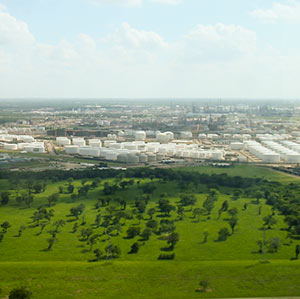DON’T Y’ALL GO WORRYING ABOUT THE FALLING PRICE OF OIL NOW  Houston real estate reporter Ralph Bivins has been watching all those tanking oil prices: “Prices for West Texas Intermediate oil, over $107 per barrel in June, has fallen sharply, dropping below $80 a barrel this fall,” he writes. “WTI closed at $77.18 per barrel Wednesday and dipped even lower on Thursday morning.” But the worst prediction of doom and gloom he’s able to scare up comes from Matthew Deal of commercial real-estate valuation firm Deal Sikes & Associates, who eventually admits that “if oil prices fall precipitously and a significant number of oil rigs are mothballed this winter, Texas real estate markets would be impacted by late 2015.” Otherwise, Houston property prices and demand are supposed to emerge not-so-scathed. And Deal’s partner Mark Sikes says way-out suburbanites have it made: Even though a drop in local job growth is likely to cause demand to dwindle for urban redevelopment sites and land slated for commercial development, he says, “suburban land for new residential communities has plenty of price support because the single-family market has tight inventories. Builders have not yet caught up with the residential boom.” [Realty News Report] Photo of San Jacinto Monument: Andrew Wiseman [license]
Houston real estate reporter Ralph Bivins has been watching all those tanking oil prices: “Prices for West Texas Intermediate oil, over $107 per barrel in June, has fallen sharply, dropping below $80 a barrel this fall,” he writes. “WTI closed at $77.18 per barrel Wednesday and dipped even lower on Thursday morning.” But the worst prediction of doom and gloom he’s able to scare up comes from Matthew Deal of commercial real-estate valuation firm Deal Sikes & Associates, who eventually admits that “if oil prices fall precipitously and a significant number of oil rigs are mothballed this winter, Texas real estate markets would be impacted by late 2015.” Otherwise, Houston property prices and demand are supposed to emerge not-so-scathed. And Deal’s partner Mark Sikes says way-out suburbanites have it made: Even though a drop in local job growth is likely to cause demand to dwindle for urban redevelopment sites and land slated for commercial development, he says, “suburban land for new residential communities has plenty of price support because the single-family market has tight inventories. Builders have not yet caught up with the residential boom.” [Realty News Report] Photo of San Jacinto Monument: Andrew Wiseman [license]





Low oil (energy) prices have all sorts of economic advantages in any location. So while in Houston, we want high oil prices to help our oil industry, we still get the same help from low energy prices that any other location would get.
.
Is it enough to offset the downside our oil industry faces? Not likely. But my point is, lower energy prices isn’t ALL bad for Houston. Many others see a nice benefit.
The Upstream rig count has been steady for four years, prices declining for their output will hurt us a little. The main reason we have still been booming is the midstream building infrastructure to get the output to market from the new fields, and upstream construction to take advantage of the historically low prices for natural gas and gas liquids. Midstream will be hurt a little if upstream prices go down, downstream will benefit.
@ Cody: There may be some offsetting benefit for the refining sector, but not really that much that would translate to significant additional employment or higher wages. The importance of upstream energy to Houston cannot be overstated. The biggest risk is that this period of low oil prices will correspond with a general recession or financial crisis, both of which seem like plausible outcomes within the next year if you’re watching the economic news closely for China, Japan, and Europe. If that’s how things line up, then Houston could bust hard.
I’m seeing a lot of downstream projects being canceled already. People in my business are very nervous. Layoffs have already started.
Here’s an except from an interview that Tillman Fertitta did yesterday on Bloomberg TV. He’s also pessimistic on oil and believes inflation is a bigger problem than the official metrics lead on. Whether you like him personally or not, he’s a huge commercial property owner and through his business lines he’s got a pretty good handle on a larger cross-section of the real economy than most commercial real estate guys do. I’m not basing my bearish thesis on his testimony, and actually I suspect that my model is a bit more sophisticated and I don’t think that it’ll be quite as bad as he thinks, but it is nice to hear some validation from this guy when everybody else wants to be a cheerleader.
Fertitta: You are seeing crazy numbers from real estate. You are seeing it New York probably more than anywhere else; you are seeing it in Texas; you are seeing it in California. History always repeats itself, but I think it’s going to repeat a little sooner this time. You see it coming.
Q. You smell a crash in the real estate market?
Fertitta: Absolutely I do. I can see it in Houston right now.
Q. It’s going to be 1986 all over again?
Fertitta: Absolutely. It didn’t come back in Texas until 1996, it took 10 years for it to happen in Texas.
Tillman must be looking to buy because he is talking up a bunch of crap. Real estate prices in Houston are high because supply has not been able to come even close to meeting demand. Multifamily is leased out at 91% in Houston. The single family inventory is under 3 months. Retail and commercial occupancy is high. What is currently under development is badly needed to meet current demand. And the main reason supply has been behind demand is the reason that there will be no 1986 or 2008 bust. Lending has been very, very tight in the current expansion. In 1986, the S&Ls were throwing money at anyone who drew a picture of an office tower on a napkin at happy hour In 2007, mortgage brokers were giving loans to anyone who could fog a mirror placed under their nose. Today, banks and investors are very tight with money. They are requiring a fish in a barrel and a shot gun with a dozen rounds as the far end of their risk. If demand in the market drops, there will be consequences, but not crashes because most everything getting built is really needed to meet current demand and not wild speculation on unrealistic predictions of future growth. If anything, Houston’s real estate market would benefit (in the long run) from some slack in demand so supply can catch up and stabilize prices. Houston could use a little more tortoise and a little less hare.
I call BS on that Tillman Fertitta story. If he feels there is going to be a crash and all this doom and gloom then why the hell is he building a 30 story hotel and conference center off the West Loop ?
“The biggest risk is that this period of low oil prices will correspond with a general recession or financial crisis, both of which seem like plausible outcomes within the next year if you’re watching the economic news closely for China, Japan, and Europe.”
As someone who has looked at the macro data, I think the global recession picture is baked in the cake. Just like the 3rd quarter US GDP numbers (juiced by a huge ramp in defense spending), most of the economic data has been massaged, manipulated and misreported to make it look better than it is. That’s why everyone in the MSM keeps touting the decline in unemployment, while give virtually no airtime to the story of declining wage growth. Explains why the US rate of homeownership continues to decline. Rampant asset inflation in the face of stagnating wages is not a recovery.
As for Fertitta, he’s simply dancing to the tune just like everyone else on Wall Street. That’s what they get paid to do. It’s a game of musical chairs, and things are going to get rather interesting when people realize the massive misallocation of capital does indeed have nasty consequences.